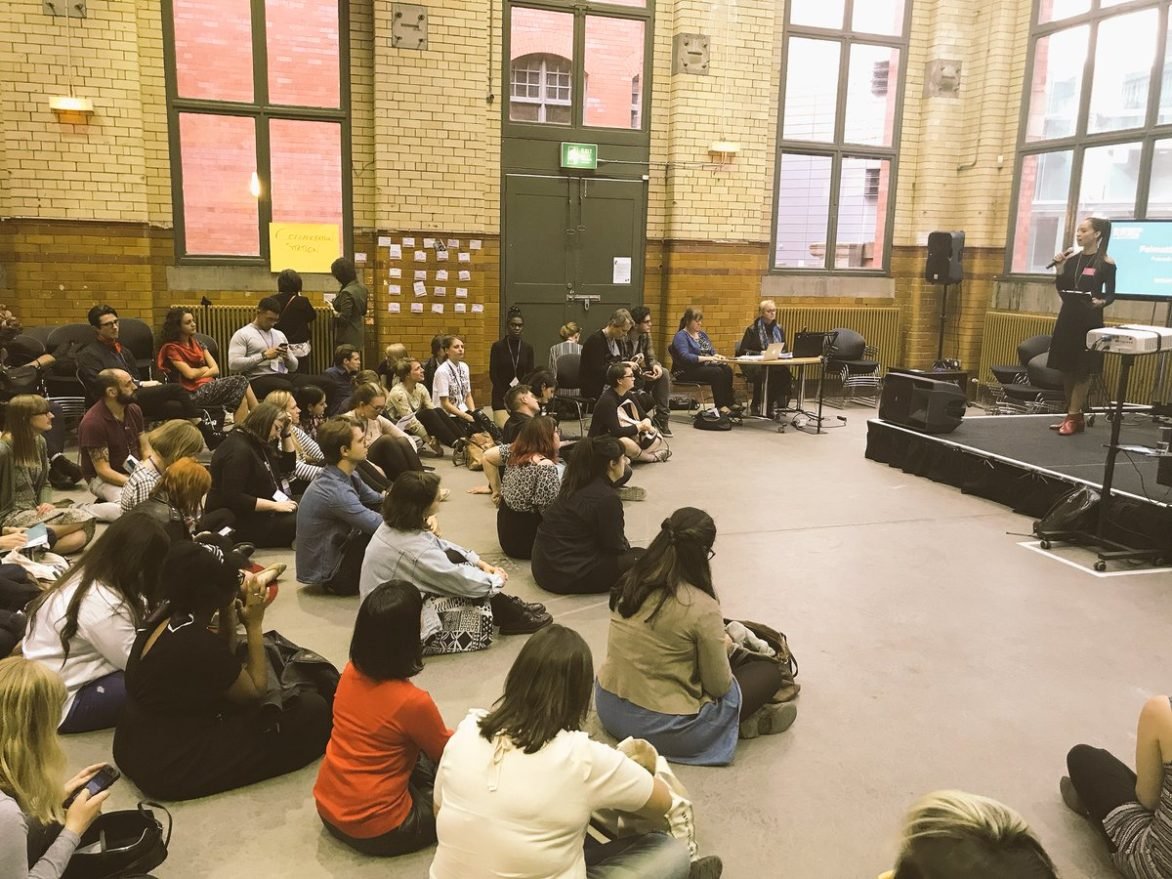When we went to Clore Leadership: Emerging Futures event
On Friday 14th September, we sent Rising team members Euella and Roseanna to Manchester to attend the Clore Leadership: Emerging Futures event to represent our OnBoard and Whose Culture programmes. Emerging Futures is an event that brings together aspiring and emerging cultural leaders, change-makers and creative entrepreneurs with inspiring creative thinkers, makers and doers – so they were in fantastic company. Below Euella reflects on what she learnt from the event and why innovative leadership is so important to her.
When I found out that Roseanna and I were going to Clore Emerging Futures event – and that I was going to be doing a five-minute lightning talk on Rising’s OnBoard – I was giddy with excitement. I felt that this was a fantastic opportunity to share some of the lessons we have learnt from our work with young people in the arts and explore the ways that people around the country are approaching issues around inclusion and leadership.
I’d never been to Manchester before, so I had no idea of what to expect when we arrived off the train at Piccadilly Station. I was instantly blown away by the city – a mini metropolis with a beat that didn’t move in time with Bristol’s rhythm. Manchester was a different, but welcomed change and Roseanna and I were determined to get the most out of our time there.
When we arrived at the People’s History Museum, the conference location, I couldn’t help but think that it was a fitting venue for such an event. It was open and bright with ceilings so high it didn’t feel like there were any. I remember thinking that Diane Morgan, the Emerging Futures Producer, must have put a lot of thought into this event. It was a truly jam-packed day, full of inspiring talks, stories and networking fun. We met so many people that were supportive of the work that we do and who pushed us to interrogate the ways in which Rising nurtures it’s future leaders (myself included).
The list of speakers was phenomenal – all of which brought their own flavour to the day. These were people who were innovative leaders and collaborators and had made valuable contributions to the arts and culture sector. They posed provocative questions about the responsibilities of cultural leaders to artists and audiences, challenged the misconceptions and barriers around achieving real cultural democracy and explored how future leaders can effectively influence change. It was so impressive how technology and the ideals of cultural democracy were embedded within the event – through live streaming on social media, using Slido to inform the discussions and the creation of an online archive to document the day. As well as Roseanna and myself coming from Bristol, Clare Reddington (CEO of Watershed), Nikesh Shukla (Writer and Co-Founder of The Good Journal and The Good Literary Agency) and Liam Wiseman from Bristol Old Vic were all in attendance. It almost felt like home.
I was glad that I was able to get a lot out of the event in regard to my own personal perceptions and approaches to leadership. Clare Reddington and Dr. Maria Balshaw proved to be excellent female role models and the range of artistic practitioners in the programme showed how creative practice could create meaningful change. Executive Coach and trainer, Sarah Cartwright provided some practical tools and techniques to improve assertiveness – which I found extremely useful – and those were only a few of the highlights.
I loved hearing from Nikesh Shukla. His quote “change is easier than everyone thinks when it comes to changing perceptions” resonated with me and the things that I’m trying to do with my own work. Nikesh’s speech made me reflect on the ways that our own perceptions can often be a barrier to progress. We often think we know what ‘a leader looks like, or the qualities that a leader should embody’ – when in reality, our ideas of ‘leadership’ can be skewed by existing power structures. When it comes to being more inclusive, Nikesh insists that we should always support people and always wonder (out loud) who is not in the room?. He taught us that we don’t have to speak on behalf of others and that if you are in a position to bring people through, make sure you bring as many people as possible. That’s why Rising’s OnBoard is so important to me. It’s an opportunity to bring other young people through, and influence meaningful change on a structural level. It is pertinent to me that we challenge some of the misconceptions about young people’s ability to lead and re-position them as valuable assets to the cultural sector.
I was lucky enough to be picked to deliver a five-minute lightning talk called ‘Young, Gifted and Innovative’ – giving me the opportunity to get up in front of the attendees and share the really exciting things we are doing with Rising’s OnBoard programme. As the event was about leadership, culture and big ideas – we felt that OnBoard was a great fit and would help spark more conversation around the role of young people and governance structures in the arts sector and beyond. There was so much I wanted to cram into those five minutes, but the most important thing I wanted the audience to take away from the talk is ‘What could young people as decision makers do for the future of our organisations? And how do we facilitate that?’. Like with everything that we do at Rising, I wanted to challenge the audience to throw out the rulebook and embrace the possibilities and potential that young talent can bring.
To kick this off I gave the example of Rising’s governance structure:
1 out of our three directors is under the age of 25
64% of our advisory board members are under 25
Our youth board were solely responsible for creating Rising’s ten-year business strategy.
One of the things I love about Rising is that it presents itself as a beautiful case study for the dynamic ways young people can be included in governance. The young people that we work with are not just artists or participants, but co-leaders and facilitators in everything we do – that’s something to shout about, right? After such a great reception at the Clore event, it has motivated us to continue doing what we’re doing and sharing our lessons with the world.
Thank you to Clore Leadership Programme for having us and thank you to all the amazing speakers who not only inspired us, but left us feeling motivated and invigorated. What’s next, you ask? Well, we are working with six Bristol organisations to deliver our OnBoard programme from October with a further five organisations on the waiting list for next year’s programme. We have got some exciting plans to partner OnBoard with existing cultural offers in the city and we will continue to advocate for the value of young people’s time, insight and art.
That’s all for now, folks. Stay tuned.
Euella and The Rising Team.




